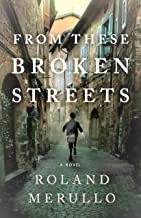Review — FROM THESE BROKEN STREETS by Roland Merullo (Micronesia)
 From These Broken Streets: A Novel
From These Broken Streets: A Novel
Roland Merullo (Micronesia 1979-80)
Lake Union Publishing
376 pages
November 3, 2020
$14.95 (Paperback)
Reviewed by Richard Lipez (Ethiopia 1962-64)
•
A gifted and versatile author of 24 books, including 18 works of fiction, Roland Merullo has now produced a historical novel that’s a humdinger, as suspenseful, revealing, and involving as any World War II fiction I’ve ever read.
In his acknowledgments, Merullo describes visiting Naples with his family and being surprised to learn of a successful four-day uprising against Nazi occupation in 1943 and then being moved to write about this remarkable but little-known popular revolt. He created this deeply researched and powerfully told tale in under a year, an amazing feat.
In September of 1943, Mussolini has been strung up, leading Fascists are in hiding, an armistice has been declared, and the Italian army is melting away. But the Germans are hanging on as Allied troops move northward. A sadistic colonel, Walter Scholl, is sent in to round up young Neapolitan men and any remaining Jews and ship them north to work camps. Then he’s meant to blow up the harbor and its nearby neighborhood, home to 150,000 people.
The resistance to these horrors is swift and wide, and Merullo has given readers a vivid and largely sympathetic cast of characters who are in the thick of the revolt, some of them eagerly, some less so. Giuseppe DiPietra, a nerdy curator at the National Archives, has been making a secret map to show the Allies where German armaments are kept. His lover, Lucia Pastone, has a way to get the map to an American soldier who has sneaked into the area and is living undercover at a monastery. If any of these people is caught, it will be death by torture. Lucia’s father is a conscience-stricken black marketeer who works for the mob, whose boss, a thug named Zozo, joins the revolt for reasons other than patriotism. Two twelve-year-old orphaned street boys put their survival skills to use in service of the revolt even at its most horrifyingly violent.
There’s nothing in Merullo’s biography that suggests he’s been to war — I doubt his tenure in Micronesia was Hemingway-esque—but the climactic street-fighting scenes in “From These Broken Streets” feel heart-poundingly real. The wartime hardships Merullo describes are just as memorable. Unless you’re a mob boss, getting food is a daily challenge. There’s a heart-rending scene where a good Samaritan leaves a ripe peach next to a sleeping half-starved street kid. The boy wakes up and at first he’s sure the delectable fruit is an apparition.
While a few of the Germans in the novel are sympathetically portrayed—one discreetly warns Lucia she is being stalked by a rapist—most are pretty awful. They hate the Italians for their warmth, openness, music, and vibrant family life, qualities the Germans depicted here see as weak and unappealing. By far the worst Nazi is Colonel Scholl, and Merullo has done something here I found unnerving. He’s made this cruel psycho bisexual with a constantly roving eye for young male soldiers. I kept wondering why. It’s not really implausible, but writers of novels make choices about their characters for reasons, and I was puzzled as to what that reason was in this odd case.
Except for the strange Scholl business, I found this novel to be practically flawless. Some of it will even resonate for Americans following present-day events in our own country. Here is Lucia reflecting on her life growing up under a Fascist regime and lamenting that millions of her countrymen fully supported the brutal dictator who had brought Italy to a place of ruin:
How many times had she seen the graffiti: “THE LEADER IS ALWAYS RIGHT” and “MUSSOLINI FOREVER!” No, the Italians were at least partly to blame, no matter what people liked to believe. A kind of madness had infected half the country. She wondered how much suffering it would take to cure them of it.
•
Richard Lipez (Ethiopia 1962-64, PC/Washington, 1964-67) was an editorial writer at The Berkshire Eagle and reviews mysteries for The Washington Post. He writes the Don Strachey PI novels under the name Richard Stevenson.
No comments yet.
Add your comment